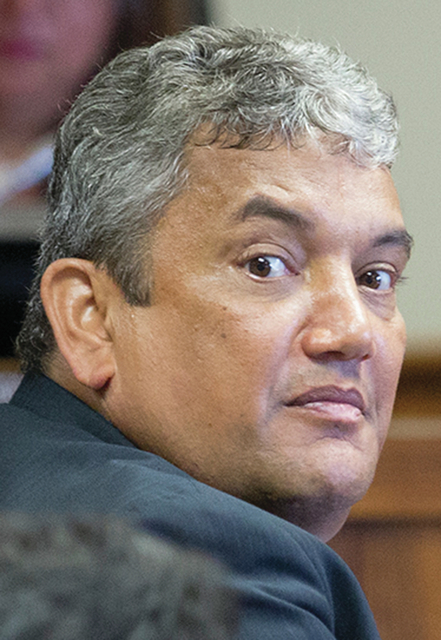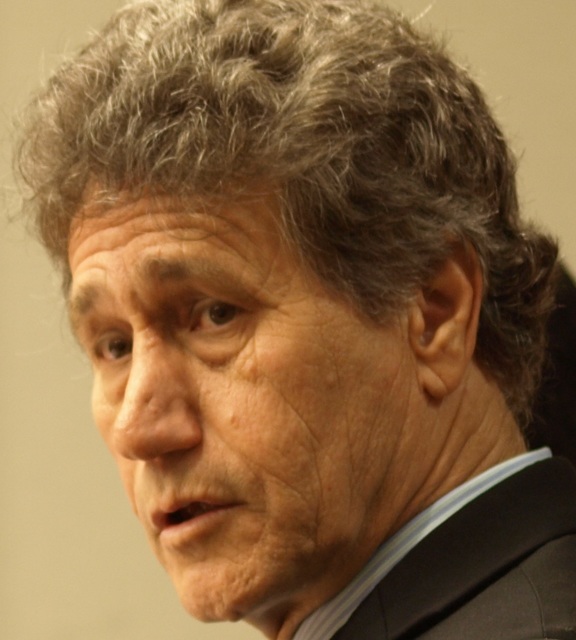County seeks to block release of Kenoi emails
County attorneys are seeking to keep the contents of 40 emails, most of them sent in the month after Big Island newspapers reported Mayor Billy Kenoi’s misuse of his county-issued credit card, secret.
ADVERTISING
The Corporation Counsel Office has refused to turn over the contents of the emails to the state attorney general, invoking attorney-client privilege.
Deputy Corporation Counsel Steve Strauss filed a motion Aug. 30 to quash a subpoena by the attorney general demanding the emails. Kenoi’s theft trial is scheduled to start Oct. 10 in Hilo.
Kenoi’s pCard charges became the focus of a criminal investigation after Big Island newspapers reported on March 29, 2015, that he used the county credit card at a Honolulu hostess bar.
In total, the mayor spent almost $130,000 on the card before it was revoked in March 2015. While most of it was for county business, there were numerous personal charges in addition to the $895 hostess bar tab, including $1,219.69 for a surfboard and $1,889 at Bike Works in Kona.
Other bar tabs included $400 at another Honolulu hostess bar and $700 at a Hilo karaoke bar.
Kenoi reimbursed the county for $22,292 in charges between January 2009 and March 2015. He later paid back approximately $9,500 more after the newspapers published their stories examining his pCard use.
After a lengthy investigation by the attorney general, Kenoi was charged with two counts of second-degree felony theft, two counts of misdemeanor theft, three counts of tampering with government records, and one count of making a false statement under oath. The felony theft charges are each punishable by up to five years in prison and a $10,000 fine.
According to a document dated June 10, 2015, titled “Attorney/Client Privilege Log,” the emails, which date from Dec. 17, 2009, to April 21, 2015, contain correspondence between Corporation Counsel Molly Stebbins and her predecessor, Lincoln Ashida, with numerous county officials, including Kenoi, Managing Director Randy Kurohara and his predecessors, Wally Lau and Bill Takaba, Finance Director Deanna Sako and her predecessor, Nancy Crawford, and current and former Kenoi executive assistants Paulette Wilson, formerly known as Paulette Cainglit, Clarysse Nunokawa, Kevin Dayton and Peter Boylan.
Most of the subject lines on the disputed emails have to do with pCard procedures and processing and media requests for records.
The earliest email the county is seeking to keep confidential was authored a week after the first documented request by West Hawaii Today reporter Nancy Cook Lauer seeking pCard statements.
Cook Lauer, who has been subpoenaed by the attorney general, had sought the records since 2009 to monitor the mayor’s travel and spending at taxpayer expense. County Finance Department officials refused to provide the documents, instead compiling summaries of charges incurred by the mayor and other top officials.
Twenty-two of the emails were dated between March 31, 2015, two days after Cook Lauer’s initial story about Kenoi’s pCard misuse — which relied on records provided by an alternative source — and April 21, 2015, about three weeks later.
The county’s motion to withhold the emails says it has “produced over 18,000 pages of documents and assisted in producing over twenty-five county employees for interviews” during the attorney general’s investigation.
Regarding the emails, the document states, “Although the state may wonder what was discussed in these communications, this does not provide a basis to violate the sanctity of the attorney-client privilege.” It also notes the subpoena seeking the emails come more than a year after corporation counsel notified state investigators of their existence.
“The corporation counsel probably would have the duty to raise (the issue of) privilege, but keep in mind the privilege belongs to the client,” Ken Lawson, a faculty member at the University of Hawaii William S. Richardson School of Law, said Friday.
“So the corporation counsel can’t just say, ‘You can have the emails.’ … Corporation counsel could not just release those items because they don’t hold the privilege. The lawyer doesn’t hold the privilege; the client (Kenoi and his administration) does. … (The attorney general) would need a court order saying that it’s not privileged.”
Strauss also filed motions to quash prosecution subpoenas seeking testimony from county Budget Administrator Nancy Kelly and Deputy Corporation Counsel Melody Parker.
Kelly has non-refundable travel plans to Europe at the time Kenoi is scheduled for trial. Records indicate her reservations were made Feb. 17, prior to Kenoi being indicted on March 23.
Parker, according to the county motion, is being called to confirm that Dayton, who is now a reporter for the Honolulu Star-Advertiser, declined to be interviewed by an investigator for the attorney general’s office. Dayton also has been subpoenaed by the prosecution.
A hearing on those motions, and a slew of others — including defense motions seeking dismissal of charges against Kenoi — will be heard in Hilo Sept. 16 by Honolulu Circuit Judge Dexter Del Rosario. Del Rosario is presiding over the case because all Big Island judges on the bench when Kenoi was indicted in March have recused themselves from hearing it.
Five prosecution witnesses, Kurohara, Takaba, Sako, Crawford and Wilson, have been offered transactional immunity in exchange for their testimony. Transactional immunity, also called “complete” and “blanket” immunity, guarantees witnesses won’t be prosecuted for anything discussed in the immunized testimony. Three attorneys have told the Tribune-Herald transactional immunity doesn’t kick in, however, until a witness invokes his or her Fifth Amendment right against self-incrimination.
“What that allows the court to do is to rule after they are granted transactional immunity that there’s no basis to assert your Fifth Amendment right. … If the witness then refuses to testify, the court can hold them in contempt (and) lock them up in jail until they do comply,” Lawson said.
Strauss told the Tribune-Herald on Friday the corporation counsel won’t be representing current or former county employees called to testify due to a conflict of interest — Stebbins was appointed by Kenoi and reports directly to him.
Strauss said those who think they need a lawyer have the option of retaining private counsel and later going to the County Council to seek reimbursement for their legal expenses.
Lawson said it will be hard for the state to obtain a theft conviction at trial “because you have to prove specific intent.”
“That’s why the charge is hard to prove and that’s why the AG is going after everything they can by seeking those records. They’re trying to get after his intent,” Lawson said.
“If the mayor is saying, ‘Listen, not only did I do this, but I had the intent of paying it and other people have done the same thing and you haven’t done anything to them,’ it’s going to be a hard charge for the attorney general to prove beyond a reasonable doubt. Because they do have to demonstrate that the specific intent was not only to take your property but to never give it back.”
Email John Burnett at jburnett@hawaiitribune-herald.com.





